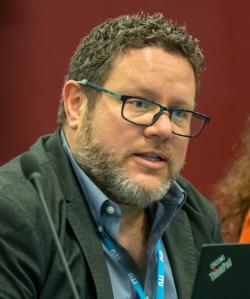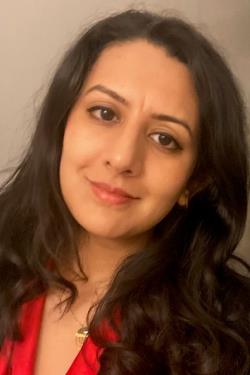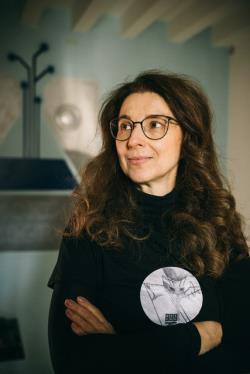How do we ensure the internet delivers for everyone in twenty years' time?
UK Internet Governance Forum Steering Committee in collaboration with Identity Digital, DNS Research Federation and Rhizomatica
Session 308
In this session, we will explore what a truly 'inclusive' Internet that delivers on the promise of WSIS and the SDGs looks like now and twenty years into the future, and how we can best bring in the voices needed to shape an Internet that delivers on the WSIS vision of a “people-centered, inclusive and development-oriented Information Society”. Throughout the discussion we will look at progress against relevant WSIS Action Lines and the SGDs, reflecting on past successes and where there is further to go so that the Internet delivers for everyone.

Carlos holds a PhD and Master's degree in Sociology from the Institute of Social Sciences and Humanities "Alfonso Vélez Pliego" of the BUAP and a Bachelor's degree in Communication Sciences from the UDLAP.
For more than 10 years he has been coordinating actions related to research, training and capacity building in the NGOs REDES AC and Rhizomatica, particularly through the Techio Comunitario training programme. As part of these functions, since 2019, he manages the "Training Programme on ICT Networks Management in Indigenous and Rural Communities in Latin America" as an ITU expert consultant; and, since 2020, he coordinates the Learning and Mentorship Area as part of the LocNet initiative in Asia, Latin America and Africa.
He has been an advisor for capacity building projects on technological and communication issues in community contexts and consultant for the development of connectivity strategies and access to telecommunications in rural and indigenous territories. In his link with academia and research, between 2019 and 2022 he was founder and general coordinator of CITSAC; in addition to being a member of the National System of Researchers (SNI) Level 1 of CONACyT of Mexico since August 2019.

Dorottya Zsiboracs works as a Policy and Research Analyst at the DNS Research Federation/ Oxford Information Labs. She previously worked on the IGF Impact project at DNSRF commissioned by the UK Department for Science, Innovation and Technology. Alongside her work, she is currently enrolled as a graduate student at the University of Oxford, pursuing a Master of Science degree in Social Science of the Internet at the Oxford Internet Institute. Dorottya holds a first-class degree in International Relations from the War Studies Department at King’s College London. Her professional experience spans diverse roles at the nexus of emerging technologies and national security, including positions as a cybersecurity consultant, open-source intelligence analyst, and policy advisor.

Alishah Shariff is Policy and Public Affairs Lead at Nominet, the .UK registry. Here she leads Nominet's work on a number of public policy issues including internet governance, and provides a Secretariat for the UK Internet Governance Forum. Previous to working at Nominet, Alishah spent 9 years in the UK Civil Service working across a range of domestic and international policy roles, most recently as Head of Digital National Security at the Department for Science, Innovation and Technology. Alishah holds a degree in Modern and Medieval Languages from the University of Cambridge.

Desiree is a Policy Advisor at Identity Digital, Name.com. She chairs the RIPE Cooperation Working Group and serves on the Council of the Generic Names Support Organization at ICANN. With over two decades of close and productive interactions with regulators, intergovernmental leaders, academics, artists, and community activists worldwide, she brings a unique set of resources to the complex, cross-sectoral challenges of Internet technical coordination and governance. Previously, she was a Special Advisor to the Chair of the UN Internet Governance Forum Advisory Group and served as a Board Member of Computer Professionals for Social Responsibility, a Trustee of the Board of the Internet Society. Currently, Desiree is the Director of the Internet Society UK England Chapter and is active in the ISOC Belgrade Chapter, where she leads the DESCON IoT Ecology Hackathon activities. She is a co-author of The Global Initiative for Empowering Digital Citizens Report - GIDE.
-
 C1. The role of governments and all stakeholders in the promotion of ICTs for development
C1. The role of governments and all stakeholders in the promotion of ICTs for development
-
 C2. Information and communication infrastructure
C2. Information and communication infrastructure
-
 C3. Access to information and knowledge
C3. Access to information and knowledge
-
 C4. Capacity building
C4. Capacity building
-
 C6. Enabling environment
C6. Enabling environment
-
 C8. Cultural diversity and identity, linguistic diversity and local content
C8. Cultural diversity and identity, linguistic diversity and local content
-
 C11. International and regional cooperation
C11. International and regional cooperation
Our speakers bring with them a wealth of experience and expertise and will speak to the Action Lines highlighted above, including through a technical community, capacity building and research lens.
The core focus of our session is how we ensure an inclusive Internet that delivers for everyone in 20 years time, with particular focus on the role of all stakeholders in the promotion of ICTs for development (C1), information and communication infrastructure and how this helps achieve digital inclusion (C2), capacity building at an individual, organisational and particularly a community level (C4) how to foster an enabling environment (C6), supporting and promoting the enhancement of cultural and linguistic diversity (C8) and international and regional cooperation (C11).
-
 Goal 9: Build resilient infrastructure, promote sustainable industrialization and foster innovation
Goal 9: Build resilient infrastructure, promote sustainable industrialization and foster innovation
-
 Goal 10: Reduce inequality within and among countries
Goal 10: Reduce inequality within and among countries
-
 Goal 16: Promote just, peaceful and inclusive societies
Goal 16: Promote just, peaceful and inclusive societies
-
 Goal 17: Revitalize the global partnership for sustainable development
Goal 17: Revitalize the global partnership for sustainable development
This session is relevant to multiple SDGs beyond those highlighted because many speak to making technology more accessible, inclusive, equitable and accountable in order to facilitate wider development objectives.
Of particular relevance to this session are the following SDGs:
9.1 Focusing on developing quality, reliable, sustainable and resilient infrastructure with a focus on affordable and equitable access for all, which will tie into discussion on connecting the unconnected and community networks.
10.2 Empowering and promoting the social, economic and political inclusion of all, irrespective of age, sex, disability, race, ethnicity, origin, religion or other status, which will tie into discussion on what an inclusive internet looks like.
16.7 Ensuring responsive, inclusive, participatory and representative decision making at all levels will tie into discussions on enabling participation in internet governance processes, which will tie in to discussion on how to better bring in youth and developing country voices into internet governance processes.
17.9 Enhancing international support for implementing effective and targeted capacity-building in developing countries to support national plans to implement all the Sustainable Development Goals, including through North-South, South-South and triangular cooperation, which will tie to discussion on capacity-building and equitable access to the Internet.
https://ukigf.org.uk
https://cnlearning.apc.org
https://www.rhizomatica.org/
https://www.dnsrf.org
https://www.identity.digital
https://www.nominet.uk